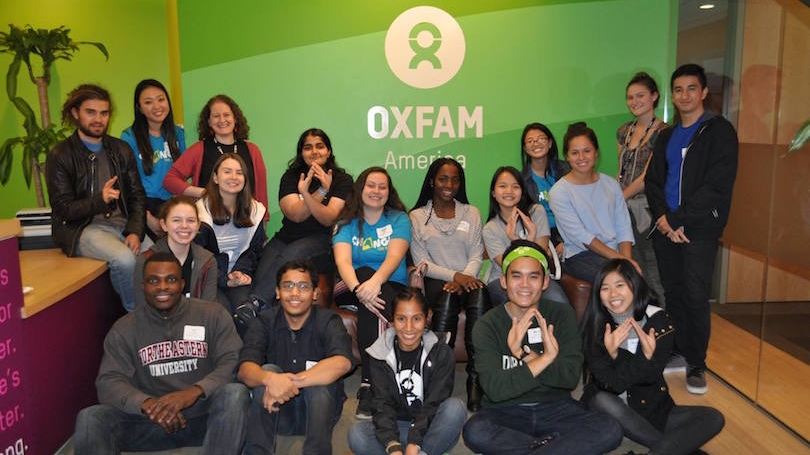
- Public Policy
- Leadership
- Funding
- News & Events
- About the Center
Back to Top Nav
Back to Top Nav
Back to Top Nav
Back to Top Nav
Oxfam was a hazy blur to me when I first joined the club. While I had learned about it to some degree in my Geography classes, when I helped form the club the conceptualization of what the organization itself did (and what we, as the Dartmouth College chapter were doing as part of it) were both shaky to me. This conference–held in Oxfam America’s main headquarters in Boston, with other area university chapters: Northeastern University, Boston University, and Tufts University–illuminated what this organization’s enormous role was and what our role as a college chapter was in the larger scheme of things as well.
We learned what Oxfam structurally was about: an organization dedicated to ending global poverty. A lofty goal, and open to potential backfiring. As a Geography major, I was reminded of the ways that organizations like Oxfam in the past (and in the present) have been prone to fail and recreating and perpetuating many of the inequalities that they sought to end. This brief introduction into Oxfam assuaged my apprehensions somewhat–a model of collaboration with the people they intend to help reduces possible neoliberal and neoimperialist structures that can produce these inequalities in the first place.
Our chapter would focus on promoting two of Oxfam’s main campaigns (which cycles every year): The STRIDE Act Campaign and the Poultry Worker campaign. The STRIDE Act seeks to transport official development assistance directly from aid-dispensing units to local government units they seek to serve–so that they have more decisional power in determining where the aid should go. The Poultry Worker campaign seeks to make consumers more aware of companies and brands that have been known (but still have yet to be convicted) for human rights abuses against their employees, most of whom are undocumented and low-income in the poultry industry. This in turn is supposed to put pressure on these companies to change their practices and pay their employees with livable wages and treat them with the proper human rights they deserve.
I had my own criticisms of each campaign–questions of accountability and transparency came up about the STRIDE Act and questions about sustainability and climate action in relation to poultry consumption came up about the second campaign. These were fruitful arguments that I had–and learning about my role in these campaigns, to bring about real meaningful change–made me all the more excited to begin our campaigns here on campus.
-Submitted by Benny Adapon '19, Rockefeller Center Mini-Grant Recipient
The Rockefeller Center's Mini-Grants program funds registration fees for students attending conferences, as well as the costs of bringing guest speakers to Dartmouth. The views and opinions expressed here are the author’s own and do not necessarily represent the views and opinions of the Rockefeller Center or constitute an endorsement by the Center.